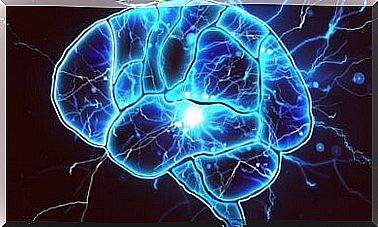Atlas Syndrome: I Bear The Weight Of The World

Do you often feel that you have the weight of all tasks and responsibilities on your shoulders? Does work, life, family and even your own thoughts weigh you down, but still you insist that everything is under your control? This state of mind defines what is known as Atlas syndrome, a reality that appears more frequently than we think.
There are many people who walk the world with the moral obligation of “power with everything.” They are aware that they are at the limit of their strength, they know that it would be appropriate to delegate and even more necessary to rest. However, this is how they understand life and how they have always been: taking responsibility for tasks and making commitments that exceed their personal resources, but that they still need to carry out.
This type of dynamics usually occurs in those who, as a child, had to take on tasks that were not according to their age. Taking care of younger siblings or taking responsibility even for parents or grandparents is something that in some way modifies the personality and vision that one has of oneself. We delve into it.

What is Atlas syndrome?
In Greek mythology, Atlas was the young titan whom Zeus condemned to have to carry the weight of the bow of heaven on his shoulders. He did it as punishment after he led, along with the rest of the Titans, a war against the Olympian gods. That rebellion went wrong and Atlas was punished with that penalty in the vicinity of his own kingdom, the garden of the Hesperides. A location that many place in the Strait of Gibraltar.
Well, as happens when trying to describe psychological realities, it is common to turn to legends or classic figures in stories. In this case, Atlas syndrome does not reflect any clinical entity that appears in diagnostic manuals either. However, it does exemplify a very specific reality that describes all those people who “carry” an excess of responsibilities on themselves.
Lost childhood and children working as adults
The British psychology journal dedicated a research article to this topic in 2011. Psychologists LZ Vogel and Savva Stavrola delved into Atlas syndrome to discover that it basically appears in people who did not have a true childhood. They were children who, for various reasons, were forced to play the role of adults by having to care for younger siblings, parents or grandparents.
These early experiences generated high anxiety in them. In many cases , they could not meet all the needs and demands of their environment, they were overcome and this undermined their self-esteem and self-concept.
Assume responsibilities to reinforce personal image
Caring for others, seeking the well-being of others, working to meet the needs of others … Whoever gets involved from an early age in these ends ends up understanding life in this way. Atlas syndrome defines those people who understand their existence by assuming an excess of responsibilities. Doing so is a way to reinforce your self-esteem, to maintain your identity.
- They are personalities who neglect their needs to prioritize that of others.
- They do not connect with their psychological and emotional realities, they put them aside because the only thing that matters is working, performing, reaching everyone — except themselves.
- They are not very assertive. They are unable to set limits and say “no” when asked for something.
- As noted in the aforementioned study by psychologists LZ Vogel and Savva Stavrol (2011), Atlas personalities show excessive sensitivity and concern for the physical and emotional well-being of others.
Atlas syndrome and mental health
Whoever lives for decades displacing their needs and turning their face to their psychological realities does not come to fruition. Atlas syndrome correlates with mood disorders such as major depression. Panic disorders and anxiety that somatize in stomach pains, headaches, vomiting, etc. are also common.
On the other hand, it is important to highlight one aspect. This reality is very common in men, the social construction of masculinity and the idea that “they should be able to do everything” are an additional motivation to assume situations of high mental exhaustion. The suicide rate among men is higher than in women and behind this hard data, this problem is often hidden.

How do I act when I think that everything is my responsibility?
It is not easy to learn to lose weight, to delegate and to focus on our own needs when we have focused our lives on others. The idea of linking self-esteem to personal image and how productive we are is not healthy. Neither is it to stand up as the sole providers of well-being, resources, and happiness for our own.
The myth that we must “power with everything” is a bad slogan that we have been sold and that we have assumed without thinking. A physical and mental pressure that translates into losing your life little by little and day by day. It is not healthy, logical or acceptable. For this reason, it is necessary to reformulate many of the mental schemes that we have validated without question.
Something like this necessarily happens because of having to go to psychological therapy, because in many cases after Atlas syndrome there are neglected depressions, unattended mental conditions. Let’s not put it off for tomorrow. No one can and should not take responsibility for others if he does not first take responsibility for himself.









